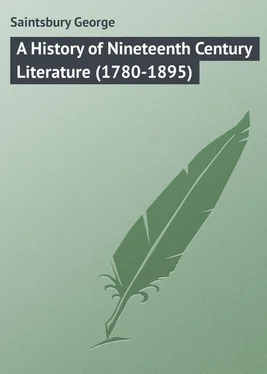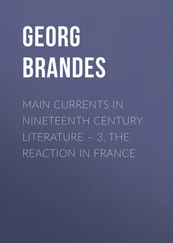George Saintsbury - A History of Nineteenth Century Literature (1780-1895)
Здесь есть возможность читать онлайн «George Saintsbury - A History of Nineteenth Century Literature (1780-1895)» — ознакомительный отрывок электронной книги совершенно бесплатно, а после прочтения отрывка купить полную версию. В некоторых случаях можно слушать аудио, скачать через торрент в формате fb2 и присутствует краткое содержание. ISBN: , Жанр: foreign_prose, на английском языке. Описание произведения, (предисловие) а так же отзывы посетителей доступны на портале библиотеки ЛибКат.
- Название:A History of Nineteenth Century Literature (1780-1895)
- Автор:
- Жанр:
- Год:неизвестен
- ISBN:http://www.gutenberg.org/ebooks/31698
- Рейтинг книги:5 / 5. Голосов: 1
-
Избранное:Добавить в избранное
- Отзывы:
-
Ваша оценка:
- 100
- 1
- 2
- 3
- 4
- 5
A History of Nineteenth Century Literature (1780-1895): краткое содержание, описание и аннотация
Предлагаем к чтению аннотацию, описание, краткое содержание или предисловие (зависит от того, что написал сам автор книги «A History of Nineteenth Century Literature (1780-1895)»). Если вы не нашли необходимую информацию о книге — напишите в комментариях, мы постараемся отыскать её.
A History of Nineteenth Century Literature (1780-1895) — читать онлайн ознакомительный отрывок
Ниже представлен текст книги, разбитый по страницам. Система сохранения места последней прочитанной страницы, позволяет с удобством читать онлайн бесплатно книгу «A History of Nineteenth Century Literature (1780-1895)», без необходимости каждый раз заново искать на чём Вы остановились. Поставьте закладку, и сможете в любой момент перейти на страницу, на которой закончили чтение.
Интервал:
Закладка:
Both the Rolliad men and Wolcot had been on the Whig, Wolcot almost on the Republican side; and for some years they had met with no sufficient adversaries, though Gifford soon engaged "Peter" on fairly equal terms. The great revulsion of feeling, however, which the acts of the French Revolution induced among Englishmen generally drew on a signal rally on the Tory part. The Anti-Jacobin newspaper, with Gifford as its editor, and Canning, Ellis (now a convert), and Frere as its chief contributors, not merely had at its back the national sentiment and the official power, but far outstripped in literary vigour and brilliancy the achievements of the other side. The famous collection above referred to, The Poetry of the Anti-Jacobin , which has been again and again reprinted, shows no signs of losing its attraction, – a thing almost unparalleled in the case of satirical work nearly a century old. Its very familiarity makes it unnecessary to dwell much on it, but it is safe to say that nothing of the kind more brilliant has ever been written, or is very likely ever to be written, than the parodies of Southey's Sapphics and "Henry Martin" sonnet, the litany of the Jacobins, French and English, the "skits" on Payne Knight and Darwin, The Rovers , – mocking the new German sentimentalism and mediævalism, – and the stately satire of "The New Morality," – where, almost alone, the writers become serious, and reach a height not attained since Dryden.
Gifford and Mathias differ from the others just mentioned in being less directly political in writing and inspiration, though Gifford at least was a strong politician. He was, like Wolcot, a Devonshire man, born at Ashburton in 1757, and, as his numerous enemies and victims took care often to remind him, of extremely humble birth and early breeding, having been a shoemaker's apprentice. Attracting attention as a clever boy, he was sent to Exeter College and soon attained to influential patronage. To do him justice, however, he made his reputation by the work of his own hand, – his satires of The Baviad , 1794, and The Mæviad next year, attacking and pretty nearly extinguishing Merry and his Della Cruscans, a set of minor bards and mutual admirers who had infested the magazines and the libraries for some years. 1 1 Although The Baviad and The Mæviad are well worth reading, it may be questioned whether they are as amusing as their chief quarry, The British Album , "containing the poems of Della Crusca, Anna Matilda, Benedict, Cesario, The Bard, etc.," the two little volumes of which attained their third edition in 1790. "Della Crusca," or Robert Merry (1755-98), was a gentleman by birth, and of means, with a Harrow and Oxford training, and some service in the army. Strange to say, there is testimony of good wits that he was by no means a fool; yet such drivelling rubbish as he and his coadjutors wrote even the present day has hardly seen.
The Anti-Jacobin and the editing of divers English classics put Gifford still higher; and when the Quarterly Review was established in opposition to the Edinburgh , his appointment (1809) to the editorship, which he held almost till his death (he gave it up in 1824 and died in 1826), completed his literary position. Gifford is little read nowadays, and a name which was not a very popular one even on his own side during his lifetime has, since the triumph of the politics and of some of the literary styles which he opposed, become almost a byword for savage and unfair criticism. The penalty of unfairness is usually and rightly paid in kind, and Gifford has paid it very amply. The struggles of his youth and lifelong ill-health no doubt aggravated a disposition at no time very sweet; and the feuds of the day, both literary and political, were apt to be waged, even by men far superior to Gifford in early and natural advantages, with the extremest asperity and without too much scruple. But Gifford is perhaps our capital example in English of a cast of mind which is popularly identified with that of the critic, though in truth nothing is more fatal to the attainment of the highest critical competence. It was apparently impossible for him (as it has been, and, it would seem, is for others,) to regard the author whom he was criticising, the editor who had preceded him in his labours, or the adversary with whom he was carrying on a polemic, as anything but a being partly idiotic and partly villainous, who must be soundly scolded, first for having done what he did, and secondly to prevent him from doing it again. So ingrained was this habit in Gifford that he could refrain from indulging it, neither in editing the essays of his most distinguished contributors, nor in commenting on the work of these contributors, outside the periodicals which he directed. Yet he was a really useful influence in more ways than one. The service that he did in forcibly suppressing the Della Cruscan nuisance is even yet admitted, and there has been plentiful occasion, not always taken, for similar literary dragonnades since. And his work as an editor of English classics was, blemishes of manner and temper excepted, in the main very good work.
Thomas James Mathias, the author of The Pursuits of Literature , was a much nearer approach to the pedant pure and simple. For he did not, like Gifford, redeem his rather indiscriminate attacks on contemporaries by a sincere and intelligent devotion to older work; and he was, much more than Gifford, ostentatious of such learning as he possessed. Accordingly the immense popularity of his only book of moment is a most remarkable sign of the times. De Quincey, who had seen its rise and its fall, declares that for a certain time, and not a very short one, at the end of the last century and the beginning of this, The Pursuits of Literature was the most popular book of its own day, and as popular as any which had appeared since; and that there is not very much hyperbole in this is proved by its numerous editions, and by the constant references to it in the books of the time. Colman, who was one of Mathias' victims, declared that the verse was a "peg to hang the notes on"; and the habit above referred to certainly justified the gibe to no small extent. If the book is rather hard reading nowadays (and it is certainly rather difficult to recognise in it even the "demon of originality" which De Quincey himself grants rather grudgingly as an offset to its defects of taste and scholarship), it is perhaps chiefly obscured by the extreme desultoriness of the author's attacks and the absence of any consistent and persistent target. Much that Mathias reprehends in Godwin and Priestley, in Colman and Wolcot, and a whole crowd of lesser men, is justifiably censured; much that he lays down is sound and good enough. But the whole – which, after the wont of the time, consists of several pieces jointed on to each other and all flooded with notes – suffers from the twin vices of negation and divagation. Indeed, its chief value is that, both by its composition and its reception, it shows the general sense that literature was not in a healthy state, and that some renaissance, some reaction, was necessary.
The prominence of the French Revolution, which has already appeared more than once in the above account of late eighteenth century poetry, is still more strongly reflected in the prose writing of the period. Indeed, many of its principal writers devoted their chief attention either to describing, to attacking, or to defending the events and principles of this portentous phenomenon. The chief of them were John Moore, Arthur Young, Helen Maria Williams, Thomas Paine, William Godwin, Richard Price, Mary Wollstonecraft, and Thomas Holcroft. Of these Price, a veteran who had nearly reached his sixtieth year when our period commences, chiefly belongs to literature as an antagonist of Burke, as does Priestley, whose writing was very extensive, but who was as much more a "natural philosopher" than a man of letters as Price was much less a man of letters than a moralist and a statistician. Both, moreover, have been mentioned in the preceding volume, and it is not necessary to say much about them, or about John Horne Tooke (1736-1812), philologist and firebrand.
Читать дальшеИнтервал:
Закладка:
Похожие книги на «A History of Nineteenth Century Literature (1780-1895)»
Представляем Вашему вниманию похожие книги на «A History of Nineteenth Century Literature (1780-1895)» списком для выбора. Мы отобрали схожую по названию и смыслу литературу в надежде предоставить читателям больше вариантов отыскать новые, интересные, ещё непрочитанные произведения.
Обсуждение, отзывы о книге «A History of Nineteenth Century Literature (1780-1895)» и просто собственные мнения читателей. Оставьте ваши комментарии, напишите, что Вы думаете о произведении, его смысле или главных героях. Укажите что конкретно понравилось, а что нет, и почему Вы так считаете.












